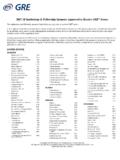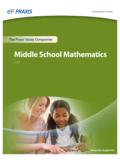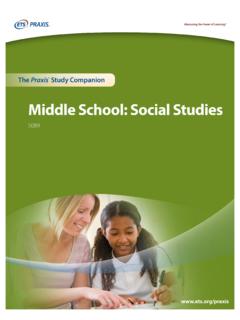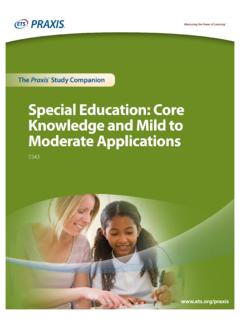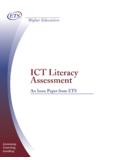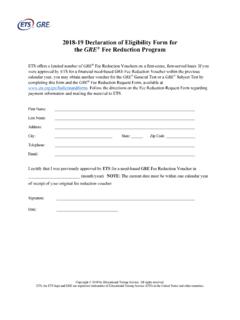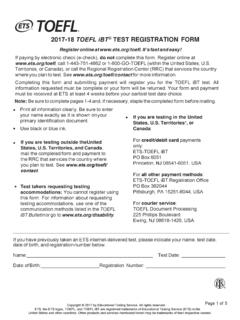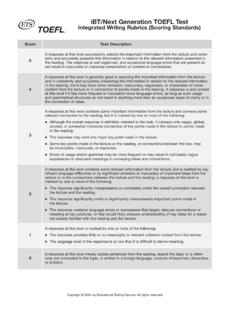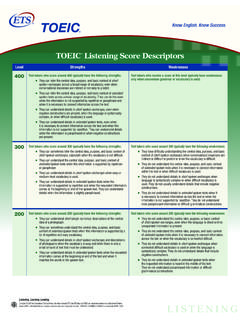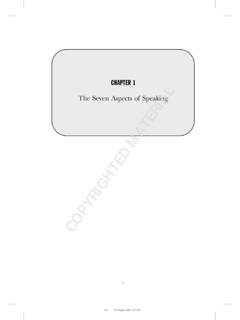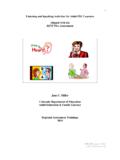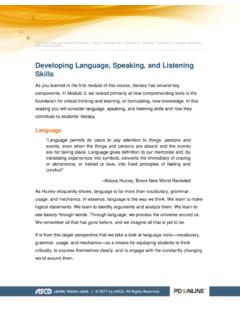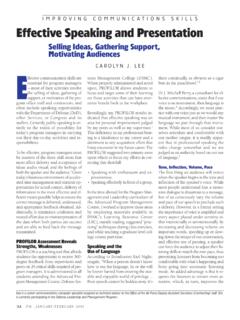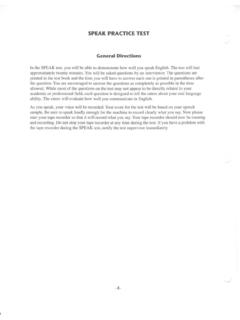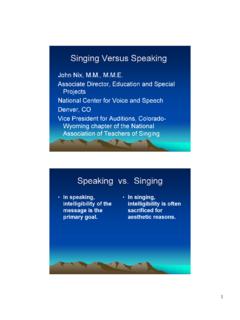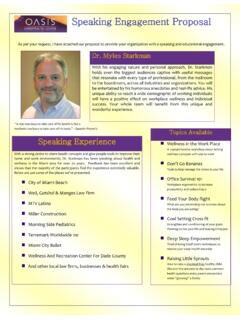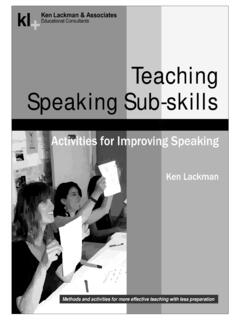Transcription of TOEFL iBT® Speaking - ETS Home
1 2018 ELL SUMMER INSTITUTE SECTION TOEFL iBT Speaking REQUIREMENTS FOR SAVING AND SUBMITTING DOCUMENTS 1. Filename: Save your document with your first and last name plus the ELL Summer Institute section and the year 2018. Example: Jane Doe TOEFL iBT Speaking 2. Identifying Info: Your name should not appear anywhere inside the document. It should only appear in the filename. 3. Submission Format: Create a separate Word document for your work sample. Do not include the instructional material or the accompanying source material in your submission.
2 Include both your Listening/ Speaking item and your Reading/Listening/ Speaking item in your document. Insert a page break between the two assignments. OVERVIEW The TOEFL iBT Speaking test is designed to evaluate the English Speaking proficiency of students whose native language is not English but who want to pursue undergraduate or graduate study in an English- Speaking context. The Speaking test is one of four sections of the TOEFL test. In the TOEFL Speaking section, examinees are asked to speak in response to material that they read and/or hear.
3 During the ELL Summer Institute, Speaking interns will write Speaking prompts on topics that are familiar to students. Interns will also research academic or campus-based topics and write various kinds of scripts used in the Speaking test. The Speaking interns might also continue after the Summer Institute in a freelance capacity as off-site writers of Speaking items. For this work sample, you will write two samples of Speaking items that are like those that appear in the Speaking section of the TOEFL test. A complete item consists of a stimulus, which is the material the examinee hears and/or reads; a prompt, which is the instruction that indicates the kind of spoken response the examinee is to make to the stimulus; and the key points, which are used by scorers as guides to the kinds of responses a high-ability examinee should make.
4 The work samples are described as follows. WORK SAMPLE TASKS Part I: A Listening/ Speaking Item The listening/ Speaking stimulus you are asked to write consists of a self-contained excerpt from an academic lecture, similar to a lecture a student would hear at a university. The stimulus is roughly 290 to 320 words in length. Examinees listen to the lecture stimulus and are then directed to give a spoken summary of the main points of the lecture. Test takers have 60 seconds to give their response. The listening/ Speaking item evaluates an examinee s ability to synthesize and summarize the content of an academic lecture.
5 You will find source material at the end of this packet to use in developing this item. Item Specifications In a lecture, the professor does the following. Introduces a concept or claim Elaborates the concept or claim by presenting two aspects, perspectives, parts, or stages that help further characterize or explain the concept or claim Illustrates each of the two differentiating aspects, perspectives, parts, or stages with a concrete, vivid example Example of a Listening/ Speaking Item The following lecture script is an example of an academic listening/ Speaking item.
6 The lecture takes place in a psychology class. The scripts are recorded by professional readers. Lecture/ stimulus (script) In psychology, when we talk about self-efficacy, we re referring to a person s belief in his or her ability to succeed at something. If you believe you re capable of dealing effectively with a situation .. or of achieving a certain goal, then you have a sense of self-efficacy about it, a belief in your ability. But where does this belief come from? Psychologists say that our sense of self- efficacy depends both on our own past experiences and on the experiences of others that we observe.
7 Now probably the most effective way of developing this belief in our ability to do something, is through past experience psychologists refer to this as mastery experience. Simply put, each time we re successful at a particular task, we increase our confidence in our ability to be successful at it the next time. For example, if you were always good at math .. throughout school, you always got good grades in it .. that success would help to gradually develop a sense of self-efficacy concerning your math skills. And then, another way we develop a sense of self-efficacy is through social models.
8 When we see another person someone we consider to be equal to or similar to ourselves accomplish a particular task, we tend to believe in our own ability to accomplish the same thing. This person is our model, and when the model is successful at something, then we re likely to believe in our own self-efficacy. For example, let s say you and your older sister are a lot alike, you have similar interests and abilities .. well, if you observe that your sister has learned to .. say .. play the piano well, then you re likely to believe you too are capable of playing piano well.
9 Because of your sister s influence your model s influence you would approach playing the piano with confidence .. with a sense of self-efficacy. Prompt Explain the two ways of developing a sense of self-efficacy mentioned in the talk. Include details and examples from the lecture in your explanation. Key points Self-efficacy is a person s belief in his/her ability to succeed in a particular situation/task/challenge. One way we increase self-efficacy is through past experience ("Mastery experience"). When we re successful at something, the success makes us more confident the next time.
10 Example: If you re good at math when young, over time you develop a sense of self-efficacy regarding your math skills. Another way we increase self-efficacy is through (social) models. Seeing someone similar to ourselves a model--succeed at something, makes us believe in our own ability to accomplish the same thing (develops our sense of self-efficacy in our ability at that task). Example: Observing your sister (model) learn to play piano well raises your belief that you too have the same ability (develops self-efficacy). Work Sample Assignment for the Listening/ Speaking Item Use the accompanying source material on helping behavior to construct an academic listening/ Speaking item of your own.
